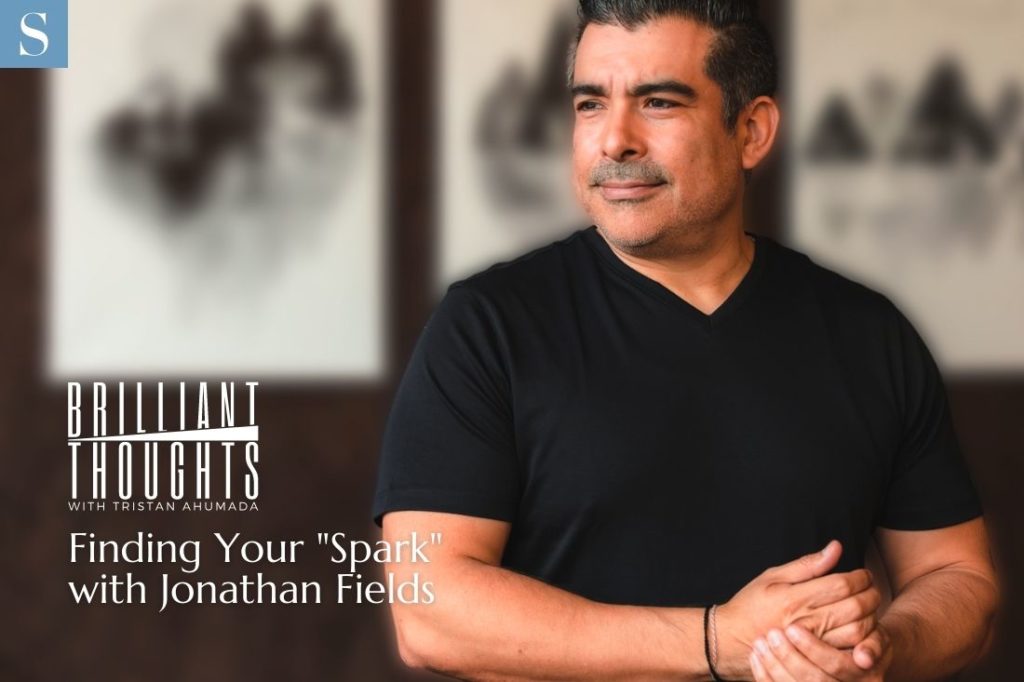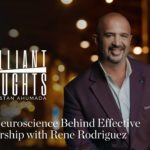“I’m a huge believer that there is no such thing as disruption without possibility,” says Fields in a recent and heartfelt conversation with Brilliant Thoughts host Tristan Ahumada. “They’re two sides of the same coin—you cannot have one without the other.”
Fields decided a long time ago to look at disruption, loss and even tragedy through a lens of growth, a decision that altered his life for the better. It laid the groundwork for his top-ranked Good Life Project podcast and his many bestselling novels, including his most recent work, Sparked. None of it would have happened if he hadn’t allowed himself to be where he was and feel his feelings.
Allow yourself to be moved.
More than 20 years ago, Fields was living in Hell’s Kitchen, Manhattan, in a new home with his wife and three-month-old baby. He had dreams of opening one of the city’s premier yoga centers, and on September 10, 2001, he finally signed the lease for an entire floor of a building.
The next day, as the planes hit the towers, after the shock and chaos settled in, he wondered who he’d lost. He says most lifelong New Yorkers knew someone who died, or at least knew their families. He wondered how he would ever be able to continue with his business and whether he should try to get out of the lease.
Fields says that as the days dragged on, people in the rest of the country were able to move on, or at least disconnect, from the tragedy. It wasn’t the same for people living in New York City who had to come face-to-face with the loss every day. Instead of running from his emotions, he made the decision to sit with them.
“I allowed myself to feel all the horror of it, but also to feel a sense of reality,” he explains. “We really do have one pass through, and none of us has any guarantees—nothing buys you out of the truth that life is impermanent and we don’t know what tomorrow is going to bring.”
Allowing it all in and letting himself be moved made him want to exercise the agency he did have and see what was possible. He decided to stick with the lease, re-engineer his plans and open up the yoga space to those who were grieving. Fields knew it could financially wreck him, but he felt compelled to go forward. As a result, he provided a service and safe space for his community to mourn and process.
Seek possibility in times of disruption.
For Fields, COVID-19 brought a familiar, heavy energy back to New York City. It reminded him of 20 years prior, when uncertainty and dread seemed to fill the air; it was terrifying. People were dying quickly and the city had to make big decisions fast, and individuals did, too. He remembers that Macy Gray was the last in-person interviewee he had on Good Life Project; every guest since then has appeared remotely.
Fields reminds us that at the beginning of the pandemic, the idea of going remote was daunting and there was a massive global learning curve. However, he opened himself up to the possibility for growth and was surprised at how they were still able to create open, honest and vulnerable conversations. By challenging his assumptions about the necessity of conducting interviews in person, he was able to continue offering value and hope to his listeners.
“I’ve sort of trained my brain to say the more disrupted I feel, the more possibility is existing,” says Fields. “If I don’t see it right now, if I don’t feel it, part of my job then becomes to seek it… because it cannot be absent in the presence of high levels of disruption or uncertainty.”
Change the story your brain tells about pain.
Reframing moments has allowed Fields to become a possibility hunter, to look for opportunities for growth in even the darkest places. Central to his ability to do this is mindfulness meditation, which he hasn’t always been consistent in practicing. However, after developing severe tinnitus—a condition that causes a high-pitched ringing in one or both ears—mindfulness meditation became his key to coping.
Uncertain of whether the ringing discomfort would ever go away, he started to research how people deal with chronic, hard-to-treat pain. He found that mindfulness could be an invaluable tool in rewiring how the brain perceived the pain and the story it told about it.
“I started to realize that pain actually, and that includes emotional suffering, is one part stimulus or circumstance and one part how your brain processes it,” says Fields. “If I can’t change the stimulus, if for some reason my brain is going to keep doing this for the rest of my life, can I rewire the way that my brain processes it?”
Intent on flipping the narrative, Fields sought out a mindfulness-based cognitive behavioral therapist and found one five blocks from his home who just so happened to have tinnitus as well. As they began their sessions, the therapist challenged him to do something unintuitive: If the sound keeps intruding, allow it to become the center of awareness, a fully immersive experience.
To Fields, this was uncomfortable, even terrible—he spent all of his time trying to avoid that high-pitched ringing. Nevertheless he tried it, sitting on his yoga cushion at home. Using his breath as an anchor, he let the sound in, let it become everything. After months of this exposure, he realized his mind had drifted away from the sound.
Now the ringing is more like a background noise, and if he doesn’t look for it, it doesn’t intrude. His brain had been telling him a negative story about the sound, and it was making his discomfort so much worse. Fields says noticing the destructive stories we tell ourselves is key to escaping those spirals.
Find your primary impulse.
We tell ourselves negative stories about work, too, but the reality is that our working lives don’t have to be miserable. With greater understanding and intentionality, they can offer deep fulfillment, which is the premise of Fields’ new book Sparked.
“Given the fact that for most people, our work tends to make up the vast majority of our waking hours for our entire adult life, what would happen if we really focused on trying to optimize that, trying to make it as good as it can possibly be?” asks Fields. He says that by finding our driving impulse, we can seek work that makes us come alive.
In the creation of Sparked, Fields’ team identified 10 work archetypes, which he calls “sparketypes.” Each one details a unique imprint of impulses and drivers that help a person understand which jobs fill them up and which ones empty them. Anyone is welcome to take the sparketype test online for free.
When you look at Fields’ life strategies, there’s a clear throughline: honest self-assessment. Being willing to do the hard work of facing pain and loss, sitting in discomfort and trying to understand hidden drivers isn’t always pleasant.
However, it may be the most important work that any of us do.
Brilliant Thoughts with Tristan Ahumada is no longer releasing new episodes on the SUCCESS Podcast Network, but you can still listen to the full conversation below.












